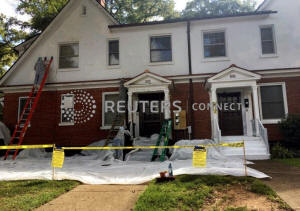|
Army calls base housing hazards
'unconscionable,' details steps to protect families
 Send a link to a friend
Send a link to a friend
 [February 16, 2019]
By Joshua Schneyer, Andrea Januta and Deborah Nelson [February 16, 2019]
By Joshua Schneyer, Andrea Januta and Deborah Nelson
WASHINGTON (Reuters) - Deeply troubled by
military housing conditions exposed by Reuters reporting, the U.S.
Army's top leadership vowed on Friday to renegotiate its housing
contracts with private real estate firms, test tens of thousands of
homes for toxins and hold its own commanders responsible for protecting
Army base residents from dangerous homes.
In an interview, the Secretary of the Army Mark Esper said Reuters
reports and a chorus of concerns from military families had opened his
eyes to the need for urgent overhauls of the Army’s privatized housing
system, which accommodates more than 86,000 families.
The secretary’s conclusion: Private real estate firms tasked with
managing and maintaining the housing stock have been failing the
families they serve, and the Army itself neglected its duties.
“You’ve brought to light a big issue that demands our attention,” Esper
said on Friday morning at the Pentagon. “It is frankly unconscionable
that our soldiers and their families would be living in these types of
conditions when we ask so much of them day in and day out.”

The Reuters reporting described rampant mold and pest infestations,
childhood lead poisoning, and service families often powerless to
challenge private landlords in business with their military employers.
Many families said they feared retaliation if they spoke out. The news
agency described hazards across Army, Navy, Air Force and Marine Corps
base housing communities.
"It’s encouraging to see the Army taking action," said Eryn Wagnon, a
director at non-profit the Military Officers Association of America. "We
hope to see a collective solution come together consistently across the
military services."
Other military branches didn't elaborate on their plans on Friday,
though the Navy said it would announce further actions soon.
The reports have already spurred a raft of reforms and investigations.
On Wednesday, U.S. senators pledged more action to come during Senate
Armed Services Committee hearings.
Two days after those hearings, the Army outlined to Reuters its
immediate and longer-term plan of reform.
“Our instinct is this is bigger even than what’s been reported, and we
want to get to the bottom of it, get to the bottom of it fast,” said
General Mark Milley, the Army’s Chief of Staff.
To do so, the Army said it will conduct an extensive survey of its
family housing across the country to define the scope of potentially
hazardous conditions. Reports in the past, provided by the private
industry companies themselves, painted a “false picture,” Milley said.
Army leaders singled out mold infestations as the leading cause of
health concerns. On Thursday, the Army ordered its private partner at
Maryland’s Fort Meade, Corvias Group, to conduct air quality testing in
the nearly 2,800 homes it operates there, and report back within 60
days. The Army expects Corvias to cover the costs, up to $500 per home.
The directive came after Army leaders visited Meade, hearing first-hand
about pervasive mold and maintenance lapses.

An earlier Reuters report described Meade families suffering from
mold-related illnesses, ceilings collapsing in children’s bedrooms, and
maintenance neglect leaving families unprotected from hazards.
[to top of second column]
|

Homes at Fort Benning undergo lead paint removal as the U.S. Army
mobilizes to protect residents against lead poisoning hazards in
Fort Benning, Georgia, U.S., September 10, 2018. REUTERS/Andrea
Januta/File Photo

In addition, the Army said it will begin renegotiating the 50-year
housing contracts it has with its seven private housing partners,
including Corvias. As Reuters reported, Corvias stands to earn more
than $1 billion in fees and other compensation from six of the 13
military bases where it operates. Its fees continued flowing even as
maintenance lapses plagued service families.
"Providing housing for our armed service members is a privilege and
Corvias is making changes to meet the expectations," the Rhode
Island-based company said in a statement.
When unsafe conditions persist, the Army will seek to reduce or
withhold fees from its private partners. It is also examining ways
to give service families more avenues to stop rent payments if
problems are not quickly addressed, Milley said.
The re-negotiation process could begin as early as next week, when
Army Secretary Esper will start holding regular meetings with the
CEOs of its private housing partners.
Another problem the Army acknowledged: Military commands across the
country, many times relying on the word of private partners, allowed
housing hazards to fester. Now, Milley said, Army commanders will be
tasked with greater oversight.
"My son will not 'be all that he can be,' as the Army likes to say,"
said Darlena Brown, a colonel's wife whose son's development was
stunted by lead poisoning in a Fort Benning home, and whose story
was one of those profiled by Reuters. "But I believe Army leaders
will do the right thing and now recognize how the housing has failed
some of us."

The Military Housing Privatization Initiative, the largest-ever
corporate takeover of federal housing, began in the late 1990s in an
effort to rebuild an aging military housing stock by enlisting
private developers and property managers.
“Just because someone said it’s privatized,” Milley said, “doesn’t
wash our hands of the responsibility to take care of our soldiers
and their families.”
Esper added: “We are acting now. More to follow.”
The Army statements come on the same day that President Donald Trump
declared a national emergency to obtain billions of dollars in
funding for a border wall, a plan that could divert money from
military construction budgets, including funds earmarked for
government-owned military family housing.
While the recent concerns have focused on privatized base housing,
some lawmakers warned Trump's plan could exacerbate a housing crisis
for military families.
"They will be forced to remain in 'poor' or 'failing' conditions,"
Senator Tim Kaine, Democrat of Virginia, said in a statement on
Friday.
The Army said it awaits details on how any shift in military
construction funding would affect the largest armed service branch.
(Additional reporting by M.B. Pell in New York. Editing by Ronnie
Greene and Sonya Hepinstall)
[© 2019 Thomson Reuters. All rights
reserved.]
Copyright 2019 Reuters. All rights reserved. This material may not be published,
broadcast, rewritten or redistributed.
Thompson Reuters is solely responsible for this content. |